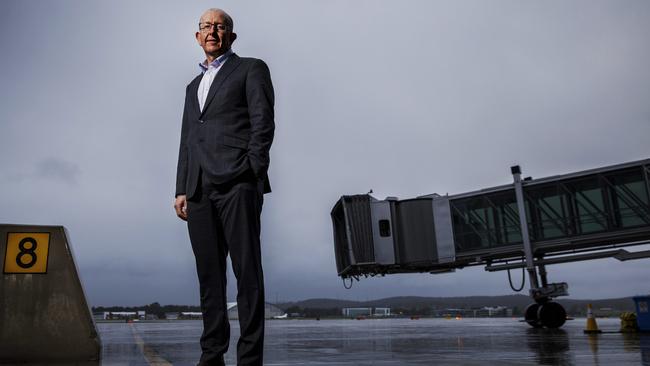Qantas and Virgin Australia’s airline duopoly ‘not conducive to competition’
Australia’s domestic airline industry is ‘more competitive than ever’ according to Qantas CEO Alan Joyce but high fares, big profits and sub-par performance suggest the opposite is true.

The competition watchdog will end its monitoring of domestic airline behaviour at a time when Qantas and Virgin Australia control 95.1 per cent of the market.
Canberra Airport CEO Stephen Byron has called out the comfortable duopoly shared by the major airline groups, saying the figure showed the domestic airline industry was the most concentrated in Australia.
He said in comparison the two top banks, Commonwealth and Westpac held 47.3 per cent of the mortgage lending market, Woolworth and Coles controlled 64 per cent of supermarket spending, and Telstra and Optus had 81 per cent of telecommunications.
On its own, the Qantas Group, made up of Qantas, QantasLink and Jetstar, carried 61.7 per cent of domestic airline passengers, while Virgin Australia flew 33.4 per cent. Rex had the remaining 4.9 per cent according to the latest Australian Competition and Consumer Commission airline report.
Mr Byron said the figures were at odds with claims by Qantas CEO Alan Joyce that Australian aviation was very competitive.
Speaking on Sky News in February, Mr Joyce said Qantas competed against 56 carriers internationally and “there were now four domestic jet airlines operating”.
“We have never had that level of competition today,” Mr Joyce said.
Mr Byron pointed out the presence that came from Rex and smaller operators Bonza and Alliance “could not really be called competition”, given they shared less than 5 per cent of the market.
“It’s almost like thinking that a servo selling chips and eggs and milk is providing price competition to Coles and Woolworths — it’s just not relevant,” he said.
“The biggest indicator of the lack of competition between the two airlines that control 95.1 per cent of the market are the sky high airfares, record profits and the extraordinary cancellations and the problems with booking fares using airline credits.”
What Australia needed, was a “competitive third airline force, with at least 15 per cent of the market”, Mr Byron said.
“The ACCC and the Australian government’s aviation white paper need to articulate the policies to get there,” he added.
His comments followed a speech to the National Press Club on Wednesday by ACCC chair Gina Cass-Gottlieb, who expressed her regret that government funding for the airline monitoring function was not being extended.
She said the commission would continue to “carefully” watch out for anti-competitive conduct but “the overall reporting unfortunately will end”.
“It is an important time to watch competition in airlines particularly because we have Bonza, a new entrant which is introducing more choice, and we have seen in the past problems about anti-competitive conduct,” said Ms Cass-Gottlieb.
“We are very concerned about slots at Sydney Airport and therefore the capacity for new competition.”
Sydney Airport chief Geoff Culbert recently took aim at Qantas and Virgin Australia for scheduling many more flights out of the gateway than they actually flew.
He suggested the strategy was intended to prevent competitors from accessing peak period slots — or authorisations given to airlines to use airports in specific time periods.
Qantas and Virgin Australia rejected his claims.
Ms Cass-Gottlieb said the ACCC was hoping a Sydney Airport demand management review that was underway would lead to more capacity for new entrants.
Mr Byron said in the interests of competition, 15 per cent of domestic slots should be carved out at Sydney Airport for a competitor airline.
He said without action, travellers would face continuing high airfares and average performance by two dominant airlines controlling 95 per cent of the market.
“The Virgin initial public offering (IPO) documents reference the stable competitive environment and the lack of threat from new entrants,” Mr Byron said in regards to preparations by Virgin’s owners Bain Capital to relist the airline on the ASX.
“This ought to be a ringing bell for competition regulators.”
Former ACCC chair Graeme Samuel who now advocates on behalf of Australian and New Zealand airlines said Mr Byron’s comments were “uninformed nonsense”.
“They are particularly galling coming from the CEO of an indisputable monopoly which has no hesitation in exercising its monopoly power to advantage itself to the detriment of its customers — the airlines and the travelling public,” Professor Samuel said.
Next week the ACCC will rule on whether Qantas can proceed with a planned takeover of Alliance Aviation.
The watchdog previously indicated it believed the acquisition would lessen competition in the fly-in, fly-out markets of Western Australia and Queensland.
Alliance’s board of directors are in favour of the takeover which would see shareholders receive $4.75 worth of Qantas shares for each Alliance share, in a $614m deal.







To join the conversation, please log in. Don't have an account? Register
Join the conversation, you are commenting as Logout